As for the top 10 -- well, I can't just limit it to books that came out in 2008, although several of these did. In alphabetical order by author, my favorite 10 books read in 2008 (as with all lists, it's one that could change given my mood):
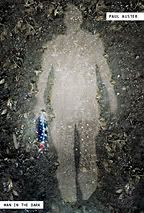 “Man In The Dark" by Paul Auster (2008) -- One of my favorite writers, Auster is dizzyingly prolific -- a book a year, usually. The last few years have seen Auster doing shorter, novella-length work, quite good but not quite at the level of his classics like "City of Glass." But this tale -- also very brief -- is concise yet hugely powerful. It starts off as a strange science-fiction pastiche of a writer imagining a devastated America left in ruins by a Bush-created civil war. What's astounding is how Auster turns these musings around into a shocking end that is among the best, starkest fiction I've seen yet generated out of "war on terror."
“Man In The Dark" by Paul Auster (2008) -- One of my favorite writers, Auster is dizzyingly prolific -- a book a year, usually. The last few years have seen Auster doing shorter, novella-length work, quite good but not quite at the level of his classics like "City of Glass." But this tale -- also very brief -- is concise yet hugely powerful. It starts off as a strange science-fiction pastiche of a writer imagining a devastated America left in ruins by a Bush-created civil war. What's astounding is how Auster turns these musings around into a shocking end that is among the best, starkest fiction I've seen yet generated out of "war on terror." “Over The Edge of the World: Magellan’s Terrifying Circumnavigation of the Globe” by Laurence Bergreen (2004) -- I love tales of exploration, about back when the world was mysterious and people drew dragons at the edges of maps. Ferdinand Magellan is one of those figures you know but don't really know much about, and Bergreen does a marvelous job telling us about his harrowing adventure circling the globe for the first time. Magellan isn't someone I admire, like Captain Cook; indeed, he's a bit of an authoritarian jerk, but he's also a project of the intensely religious, crusading culture of his time. (Sea captains usually discipline their men, but Magellan's the first one I've read of who drew and quartered someone. Ew.) Bergreen places Magellan into his context very well, and makes you feel the menace and uncertainty of the then-unknown world.
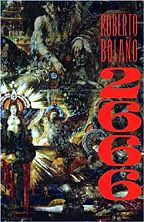 "2666" by Roberto Bolaño (in progress). (2008) -- Technically, this is a cheat, as I'm about 350 pages into this three-volume 900-page monolith. But unless it undergoes a radical deterioration, it's a thrilling ride, which reminds me in turns of some of my favorite writers like Haruki Murakami, Milan Kundera and Borges. Bolaño crafts a tale that starts out as the search for a missing, mysterious German writer, but it winds and catapults into endless fascinating digressions. Bolaño plays words beautifully, spinning out into gorgeous riffs and tirades. There's a deep sadness at its heart, yet it's also a playful, exciting work of fiction. I can't wait to read more of it.
"2666" by Roberto Bolaño (in progress). (2008) -- Technically, this is a cheat, as I'm about 350 pages into this three-volume 900-page monolith. But unless it undergoes a radical deterioration, it's a thrilling ride, which reminds me in turns of some of my favorite writers like Haruki Murakami, Milan Kundera and Borges. Bolaño crafts a tale that starts out as the search for a missing, mysterious German writer, but it winds and catapults into endless fascinating digressions. Bolaño plays words beautifully, spinning out into gorgeous riffs and tirades. There's a deep sadness at its heart, yet it's also a playful, exciting work of fiction. I can't wait to read more of it. “The Brief Wondrous Life of Oscar Wao” by Junot Diaz (2007) -- When I saw Diaz last year in Auckland, I wrote how "like Jonathan Lethem or Michael Chabon, Diaz has the knack of channeling a diet of '70s pop culture ephemera" into his fiction. But Diaz also draws on the history of his native Dominican Republic to create a kind of Spanglish fable. "Diaz" tosses geek-cred Mordor lore side-by-side with the history of one of the last century's forgotten dictators and the battered but passionate culture left behind. One of the most enjoyable writers going these days, and hopefully his next book doesn't take the 10 years or so this one did to gestate.
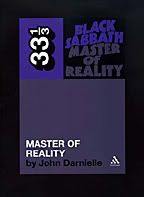 “33 1/3 series: Black Sabbath: Masters of Reality” by John Darnielle (2008) -- I've barely ever listened to Black Sabbath, but I'm a huge fan of Mountain Goats frontman John Darnielle, who turns out to be as good at fiction as he is at song lyrics. This entry in the highly enjoyable music chapbook series is a fictional diary of a Sabbath-obsessed teen in a mental institution, and Darnielle does an uncanny job of getting into the voice of an angry, unstable kid who just loves his Ozzy and Iommi. By the end of this brief story this Sabbath novice wanted to crank up "Sweet Leaf." A valentine to music and the power it can have, whether you like Sabbath or Dylan or Mozart.
“33 1/3 series: Black Sabbath: Masters of Reality” by John Darnielle (2008) -- I've barely ever listened to Black Sabbath, but I'm a huge fan of Mountain Goats frontman John Darnielle, who turns out to be as good at fiction as he is at song lyrics. This entry in the highly enjoyable music chapbook series is a fictional diary of a Sabbath-obsessed teen in a mental institution, and Darnielle does an uncanny job of getting into the voice of an angry, unstable kid who just loves his Ozzy and Iommi. By the end of this brief story this Sabbath novice wanted to crank up "Sweet Leaf." A valentine to music and the power it can have, whether you like Sabbath or Dylan or Mozart. “Team of Rivals: The Political Genius of Abraham Lincoln” by Doris Kearns Goodwin (2005) -- This one's been talked about a lot lately post-Obama's victory, and his own Cabinet choices do seem to show some of the Lincoln template – former political foes gathered together under a novice president. But Goodwin's book is also invigorating just as history, a worthy addition to the towering forests of Lincoln lit that sheds new light on Abe, the character of his cohorts like Seward and Chase, and also rescues poor Mary Lincoln a bit from the title of unbearably tragic madwoman. A great read for political junkies.
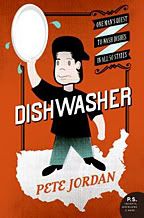 “Dishwasher: One Man's Quest To Wash Dishes in All 50 States" by Pete Jordan (2007) -- From the pages of zines (how's that for a pre-Internet buzzword?) springs this genial and amusing little gem. Pete Jordan's a dishwasher, and his mission in life isn't to move on up to being a chef or a restaurant owner -- it's to wash dishes in all 50 states. A very engaging look at a so-called "slacker" as he bops around America, washing dishes all the way. We read lots of books about writers and policemen and senators and so forth, but this humble tome shines a light on a blue-collar life, and will give you a bit of respect for the humble "dish dog."
“Dishwasher: One Man's Quest To Wash Dishes in All 50 States" by Pete Jordan (2007) -- From the pages of zines (how's that for a pre-Internet buzzword?) springs this genial and amusing little gem. Pete Jordan's a dishwasher, and his mission in life isn't to move on up to being a chef or a restaurant owner -- it's to wash dishes in all 50 states. A very engaging look at a so-called "slacker" as he bops around America, washing dishes all the way. We read lots of books about writers and policemen and senators and so forth, but this humble tome shines a light on a blue-collar life, and will give you a bit of respect for the humble "dish dog."“The Audacity Of Hope" by Barack Obama (2006) -- What turned me on to Obama was reading his first book, "Dreams from my Father." The man can write; not especially lyrically, maybe, but with an honesty, insight and ease that appeals to me. (And it really irritated me everytime I heard Obama described as some kind of utterly blank slate -- if you want to learn about the man, read his books, for cryin' out loud, which were written without ghost-writers I might add.) "Hope" is more policy-wonk focused than the highly personal "Father," and so can be a bit dry in spots, but it's a compelling summation of what he believes in and hopes to do as president. Obama is the best writer-President we've seen since Teddy Roosevelt; let's hope he measures up in other fashions.
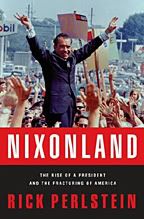 “Nixonland: The Rise of a President and the Fracturing of America" by Rick Perlstein (2008) -- Speaking of presidents -- this huge 800-page tome attempts to explain how American political culture has changed since 1960, and how it's all Richard Nixon's fault. A biography of Nixon the politician that also sums up the last 40 years or so of American life, how the change of the '60s echoed throughout the ages of Reagan, Clinton and Bushes. Will President Obama mark another change on the order of the Nixon shift, perhaps one that plays a little less to our venal natures? In a year full o' political reading, "Nixonland" offered a lot to chew on.
“Nixonland: The Rise of a President and the Fracturing of America" by Rick Perlstein (2008) -- Speaking of presidents -- this huge 800-page tome attempts to explain how American political culture has changed since 1960, and how it's all Richard Nixon's fault. A biography of Nixon the politician that also sums up the last 40 years or so of American life, how the change of the '60s echoed throughout the ages of Reagan, Clinton and Bushes. Will President Obama mark another change on the order of the Nixon shift, perhaps one that plays a little less to our venal natures? In a year full o' political reading, "Nixonland" offered a lot to chew on. “The Wild Trees” by David Preston (2007) -- I reviewed this in length earlier last year, and I still love it. An epic look at a world high in the redwood trees on Northern California, a rare and remote ecosystem most of us will never see.

No comments:
Post a Comment